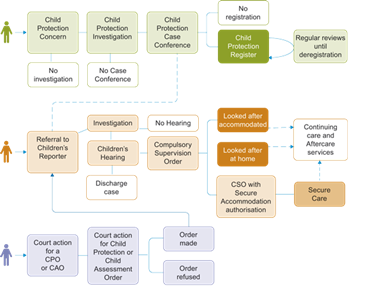These pages have information about your rights and what to do if you feel we’re not listening to you. If you do not believe your rights are being upheld, you can make a complaint.
We want you to feel respected and that you have been treated fairly, even if you disagree with some of the decisions being made to keep you and your family safe.
We would love to hear what we are getting right or ideas on where we can improve to make things even better for you and your family. You can leave a suggestion, comment or compliment using our enquiry form.
National guidance around protecting children and young people
The United Nations Convention on the Rights of the Child (UNCRC)
This is an international agreement setting out the civil, political, economic social and cultural rights of every single child. This means that the rights of children are protected and promoted in all areas of your life, including your rights to:
- education,
- freedom from violence, abuse and neglect,
- be listened to and taken seriously,
- a proper house, food and clothing, and
- relax and play
The Children and Young People's Commissioner Scotland has a simplified guide to the articles of the UNCRC.
Laws applying to children and families in Scotland
Children (Scotland) Act 1995: This Act sets out the legislative framework for child welfare in Scotland, including provisions related to parental responsibilities and rights, the welfare of the child, and court orders concerning children. This Act provides the legal framework for local authorities to provide accommodation for children who need care and protection. It sets out the criteria for assessing a child's need for accommodation and the duties of local authorities in ensuring the welfare of accommodated children.
Children and Young People (Scotland) Act 2014: This Act focuses on improving outcomes for children and young people, it includes provisions such as early learning, Getting it Right for Every Child (GIRFEC) and includes the extension of aftercare support for care leavers up to the age of 26.
Children (Equal Protection from Assault) (Scotland) Act 2019: This Act made it illegal for parents or caregivers to use physical punishment on children, ensuring that children in Scotland have the same legal protection from assault as adults.
Children's Hearings (Scotland) Act 2011: This Act establishes the legal framework for the Children's Hearings System in Scotland, which deals with the care and protection of vulnerable children and young people who need compulsory measures of supervision or care. Children can be accommodated under this Act through compulsory supervision requirements imposed by the Children's Hearing or by court orders.
This diagram shows the various routes that can lead to a child being referred to the reporter:

Looked After Children (Scotland) Regulations 2009: These regulations set out the standards and procedures that local authorities must follow when accommodating children in Scotland. They cover aspects such as placement arrangements, care planning, review processes, and the rights of children in care.
Under these legislations, children in Scotland can be accommodated by local authorities when it is deemed necessary for their welfare and protection. Accommodation can be provided in various settings, such as foster care, residential care, kinship care, or through other suitable arrangements, depending on the individual needs of the child.
Relevant Orders:
S.22 Children (Scotland) Act 1995 – local authorities have a duty to safeguard and promote the welfare of children in need. This can be provided by giving in kind or in financial support.
S.25
S.26 – The local authority will explore appropriate options for accommodation, including family, relatives, any other suitable person or a residential establishment. (Please see Arrangements to Look after Children (Scotland) Regulations 1996 for the responsibilities of the Local Authority).
Child Assessment Order – (s.35) Local Authority applies to the sheriff when there are concerns for the welfare of a child, if it is granted then this allows the Local Authority 7 days to complete an assessment of need,
Child Protection Order (CPO)- (s.37) – The sheriff will grant a CPO where the child is being treated or neglected and is suffering significant harm, the child will suffer significant harm if not removed to a place of safety or it is necessary to protect the child from actual or anticipated harm. All CPO’s must be referred to the reporter.
Emergency Protection of Children (s.55 and 56) – This is sought when there is not the opportunity to apply for a CPO, the application goes to a magistrate’s court.
Care experienced or care leave young people
Ages 16 to 19
Local authorities have a duty to provide ‘Continuing Care’ for young people who are looked after away from home at or beyond their sixteenth birthday.
Scottish Government guidance on continuing care.
Not all young people who are looked after away from home at or beyond their sixteenth birthdays are eligible for continuing care – for example, if you are in secure accommodation, you are not eligible.
Ages 19 to 26
If you are a care leaver and aged between 19 and 26 you may be able to get more help. You can ask us to carry out an ‘eligible needs assessment’. From this, we can identify any needs you may have and provide advice, guidance, and help to make sure your needs are met.
If you are care experienced and still being cared for by foster carers, kinship carers or living in a residential house, you may be eligible to remain there up until age 21 under continuing care arrangements. You have the right to remain if you and your carer agree.
Bursaries
All young people will be entitled to access a Care Experienced Bursary at college and or university.
Other financial support
Young people who are entitled to a full service will also receive financial support such as access to a leaving care grant when they move onto independence. Find out more at Benefits for care-experienced students
Housing
Care experienced young people can be awarded platinum priority when applying for their own tenancy in Angus. They also do not need to pay Council Tax.
Rights for parents, carers and families
All your contact with us should support you and your families’ rights.
We want you to feel respected and that you have been treated fairly, even if you disagree with some of the decisions being made to keep you and your family safe.
It is important you always know what to expect when working with us, and your views are listened to and acted upon when possible. If you feel this is not happening, you have a right to ask us to do this and we must consider it.
You also have the right to have people speak up for you on your behalf. This person is an Advocacy Worker.
Find out more at Angus Independent Advocacy.
We also work closely with Who Cares? Scotland who can also help you get your views heard. We will discuss the role of an Advocacy Worker and how they can help you when social work is involved.
Kinship care
The kinship.scot website has a section dedicated to legal information relating to kinship care.
Parents of children with disabilities
If your child or young person is assessed by a social worker as having a disability, being badly affected by the disability of another person in the family or whose health or development may be harmed or may fall below a reasonable standard without services from the local authority, you are able to get support for Under Section 22 (service to children in need) and Section 23 (children affected by disability) of the Children (Scotland) Act 1995.
We also have a duty to the families who are caring for a child or children with disabilities to assess them for support their physical and emotional wellbeing under Section 24 (All about Me and What I Need to Continue to Care) of the same 1995 Act.
More about Children with disabilities
Parental rights
Your rights include being able to make choices about:
- how your child is brought up
- where your child should live
Who has parental responsibilities and rights?
All mothers have parental responsibilities and rights as soon as they give birth to a child.
A birth mother's parental responsibilities and rights can be removed by a court. They will also be removed if a birth mother's child is adopted. Not all fathers have parental responsibilities and rights.
For more information, go to mygov.scot and search for "parental responsibilities".

